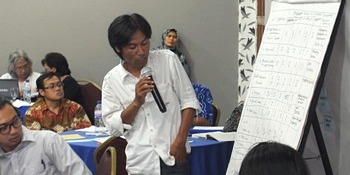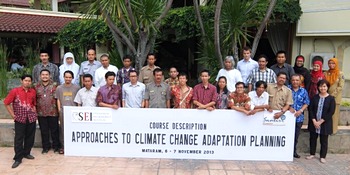SEI is working with partners in Indonesia and the Philippines to test new, customizable training modules on climate change adaptation planning, using both in-person and web-based workshops.

Climate change poses significant threats to islands in the Asia and Pacific region, most notably from rising seas and extreme weather events. Adaptation can help reduce risks to human lives and well-being, but adaptation planning requires specialized knowledge and technical skills. On small, hard-to-reach islands, away from national government and academic centres, building that capacity can be a challenge.
An ongoing SEI project, “Strengthening Climate Adaptation Planning through Customized Learning Approaches”, aims to fill that gap. Starting from the recognition that logistical constraints will always make it difficult to provide in-depth, in-person training in remote locations, the team focused on two key concerns, says project leader Ruth Butterfield:
• Ensuring that workshops are as targeted as possible to local needs – a “demand-driven approach”, and
• Making it easier for ongoing training to be provided remotely, via webinars, and for web-based modules to be used without an SEI trainer present at all.
The first element is crucial, Butterfield says, because a lot of adaptation capacity-building is fairly generic, assuming that people are starting at the same level, and that they need to learn the same things. The SEI Oxford team has taught many workshops and found participants have very different needs based on where and who they work with and what their organizational mandate is.
“In this project, we wanted to get a better sense of local needs and try to tailor the material accordingly,” she says. “We wanted to break it down and contextualize it for the local situation, both in terms of the examples we use, and in making sure we start where people are at in the adaptation process.”
Strengthening SEI’s capacity to do remote training would have long-term benefits for small islands, Butterfield says. Although it cannot match the value of face-to-face interaction with SEI’s experts, it would allow for more extensive follow-up and additional capacity-building. However, remote training also requires modern technology and strong institutional support, neither of which is a given.
As part of the project, the Oxford-based weADAPT team worked with colleagues at SEI-Asia to create new, customizable learning modules, and in November, they tested them at two-day workshops in Lombok, Nusa Tenggara Barat, Indonesia, and Dumaguete, Negros Oriental, the Philippines. (The latter was very timely, just three days after Typhoon Haiyan/Yolanda.) Altogether, about 40 participants from local government, research organizations and NGOs were trained.
Both workshops were organized with local partners: the Santiri Foundation, a small NGO, in Mataram, and Silliman University in Dumaguete. The first day of each session, the training was done entirely in person; the second day, SEI Oxford colleagues also gave presentations via the web.
“In the Philippines it worked quite well,” says Anna Taylor, an SEI Oxford researcher working on the project. “In Indonesia it was more difficult, because participants’ English wasn’t great, so a lot of the content needed to be translated, and also it took a while to get the technology working properly.”
The workshops covered methods for analysing climate change impacts and vulnerability, engaging stakeholders, and identifying suitable adaptation measures. Much of the work was hands-on, building new skills and knowledge through different exercises. Participants were also introduced to weADAPT, the adaptation knowledge platform developed and managed by SEI Oxford, and encouraged to use it as a resource.
“Our local partners were in need of ways for assessing climate vulnerability that are participatory and empowering. The module on vulnerability assessment did just that. Also, participants were pleased to learn that a portal such as weADAPT is available to respond to some of their needs as and when they arise,” says Albert Salamanca, coordinator of the project in SEI’s Asia Centre.
The project team is now doing a follow-up survey to gather more formal feedback from participants and determine what further activities would be most useful to them.
“Our successful partnerships with the Santiri Foundation in Lombok and Silliman University in Dumaguete will enable them to build a local community of practice around climate adaptation planning, with support from SEI as needed,” says Salamanca.
In addition, the team plans to use the workshop feedback to further improve the training modules, so that SEI staff can use them for future capacity-building in places with similar needs around the world.
This project is supported by the Swedish International Development Cooperation Agency (Sida), through SEI programme support.
Learn more about the project »
See the training modules on weADAPT »

The workshop participants in Mataram, in Indonesia. Follow-up training will be provided remotely.
Design and development by Soapbox.



